In July, vcDORA (DORA voice credit, not DORA venture capital!) was introduced. Although it has not been widely used across the Dora communities thus far, it was designed as a general voice credit for Dora communities to reach consensus, make decisions, and fund new BUIDLs — ventures / hacker teams / public goods in the multi-chain ecosystem and beyond.
This article provides more background and details of vcDORA, what it is, how it was designed, and how to use it in Grant DAO governance.
Open Community Grant DAO Governance
Grant DAOs are increasingly important for blockchain ecosystems to grow - ventures, events, communities, public goods can all be funded by Grant DAOs. Grant DAOs are also becoming increasingly popular within the DoraHacks community. The BNB Grant DAO funded 216 ventures and public goods in one single round, including InsurAce, a decentralized insurance protocol that successfully recovered $12M UST depeg loss for its users, Space ID, a BNB domain name service, and Zecrey, one of the teams driving the most recent zkBNB scaling initiatives.
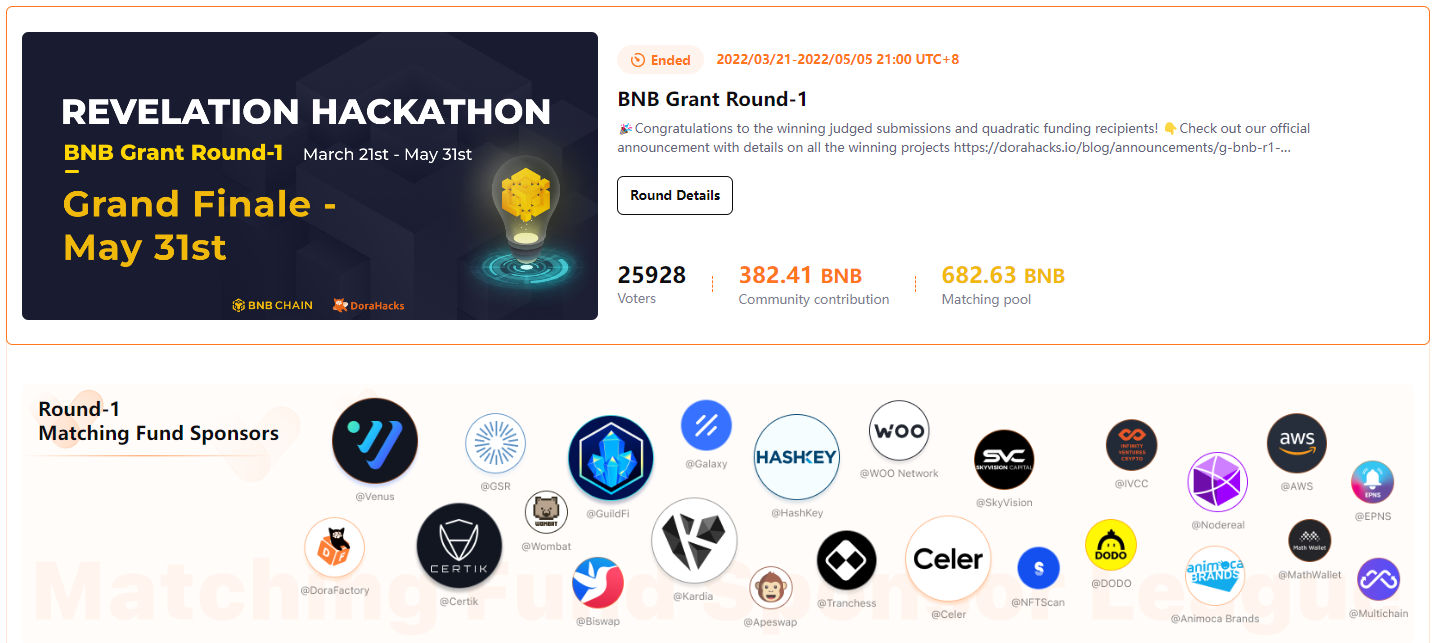
Grant DAOs are funding distribution machines, controlled and governed by its communities over funding distribution decisions.
There are different types of Grant DAOs. Depending on the goal, the size, the stakeholder structure, entry requirements, the nature of initiatives a Grant DAO funds, a Grant DAO can take different shapes. A boutique Grant DAO with a small number of stakeholders can be gated, and a board of directors can make high quality decisions. A medium-sized, semi-public, community funded Grant DAO can employ a certain degree of decentralized governance by utilizing tools like Moloch DAO - mechanisms that create semi-gated communities and allow members to make collective decisions with predefined rules.
However, the holy grail is open community grant DAO governance. There are large and open communities, such as quadratic funding communities of blockchain ecosystems and ecosystem-wide grant DAOs.
The BNB Grant DAO is an example of a large, open community, and it’s one of the largest ecosystem-level grant communities that uses quadratic voting to allow both institutions and the community to contribute to future ventures and multi-chain public goods.
The upcoming Dora Grant DAO is another example of open community grant DAO. It is governed by the DORA token community, and everyone can easily “join” the DORA token community if their balance of DORA is greater than zero. Therefore, technically there is no permission required to join such a community.
Open community Grant DAOs face greater complexities and challenges than gated communities. First, because everyone can join a community, it’s easy to forge identities, therefore the cost of sybil attack is low. This problem is escalated if a Grant DAO uses quadratic voting / quadratic funding for fund distribution. Other challenges include vote bribery (collusion), inequality (fairness), and voter privacy.
Luckily, there are already mechanisms and products tackling these problems. For example, MACI is a good anti-collusion solution so far. DoraHacks MACI almost completely prevented common vote bribery in recent grant rounds. A Grant Funding Distribution Algorithm showed good performance in the 4th Solana quadratic voting grant and successfully reduced funding gap between projects. The grant funding algorithm further led to near-zero sybil attacks, because sybil transactions will be taxed heavily and the return of sybil attack is diminished.
Although we can find effective ways to solve collusion and distribution inequality problems, it seems harder to elegantly solve identity forgery on blockchain applications with some single algorithm or process. Why? Because although the identity verification problem seems to be straightforward, it involves systemic complexity which is hard to encapsulate. Current identity systems mostly require users to verify personal information or use online data as proof of human / reputation, and there are many of them (each providing some feature but none can provide a universal solution).
In addition to the systemic complexity, there are two fundamental tradeoffs in information-based identity verification systems.
Trade-off between permissionlessness and information availability
Identity information mostly lives off-chain, verifying a person in a decentralized application either requires bridging identity information on-chain, or creating on-chain identities, both of which are systematically difficult. If a DAO’s governance protocol heavily relies on off-chain information, it inevitably trades off decentralization and permissionlessness.
Trade-off between privacy and the ability to verify identities
Information based identity verification trades off privacy, this is an obvious one. Zk identity is probably a long-term solution, but it requires many infrastructures that we currently don’t have. If we have zk identity, we still need to rely on honest operators that do not leak information. (Nevertheless, zk identity is cool technology that is worth building!)
For communities governed by tokens, the identity problems are a nightmare. Is it possible to create a practical solution that totally avoids using additional information verification tools, and only relies on proof of stake?
vcDORA
vcDORA is a type of veToken for open grant community governance. Before vcDORA, veToken had already been widely used. The most famous use of veToken is Curve Finance. The veCRV system was designed as a governance layer to make critical token distribution decisions, via its curve.fi DAO. The most distinctive character of curve’s veToken is time-declined governance power, which is different from direct token voting and delegated token voting that most DAOs currently use.
** A good read about veToken is Delphi Digital’s article, and this one about permissionless governance layering. For Chinese language, read DAOrayaki’s coverage 1 2.
In Curve Finance’s case, the veToken was created from token staking, and then used in Gauges that decide which liquidity pool gets more boosted token rewards. Because there is no quadratic voting involved, there is less concern over sybil attacks. What’s more interesting about it is that instead of banning vote-bribing by reintroducing centralized censorship or additional human-defined rules, it creates a market that allows token holders to compete in the curve war.
There are some good properties of veToken that are not Defi-specific and can be used in general open community governance:
- Staking based governance system → permissionless participation, users do not need to provide additional information.
- Encoding token staking (the amount) and staking time with one value.
- Governance power (aka influence) diminishes over time → less gerontocracy, permanent control is hard, cost of governance attack is quadratically higher than pure token voting systems.
Considering that the primary goal of Grant DAOs is to distribute funding. By using some of veToken’s features, we can improve Grant DAO governance in the following ways:
- Represent governance power with stake - time, instead of only stake
- Continuously renew governance power structure
- Removing the need of identity verification based identity verification methods and increase voter privacy
Now let’s look at details of vcDORA through some key properties.
Permissionless — vcDORA is created from Dora Staking. As staking DORA only needs two inputs, DORA and time, the process is permissionless. Notably, the process does not require input of personal information.
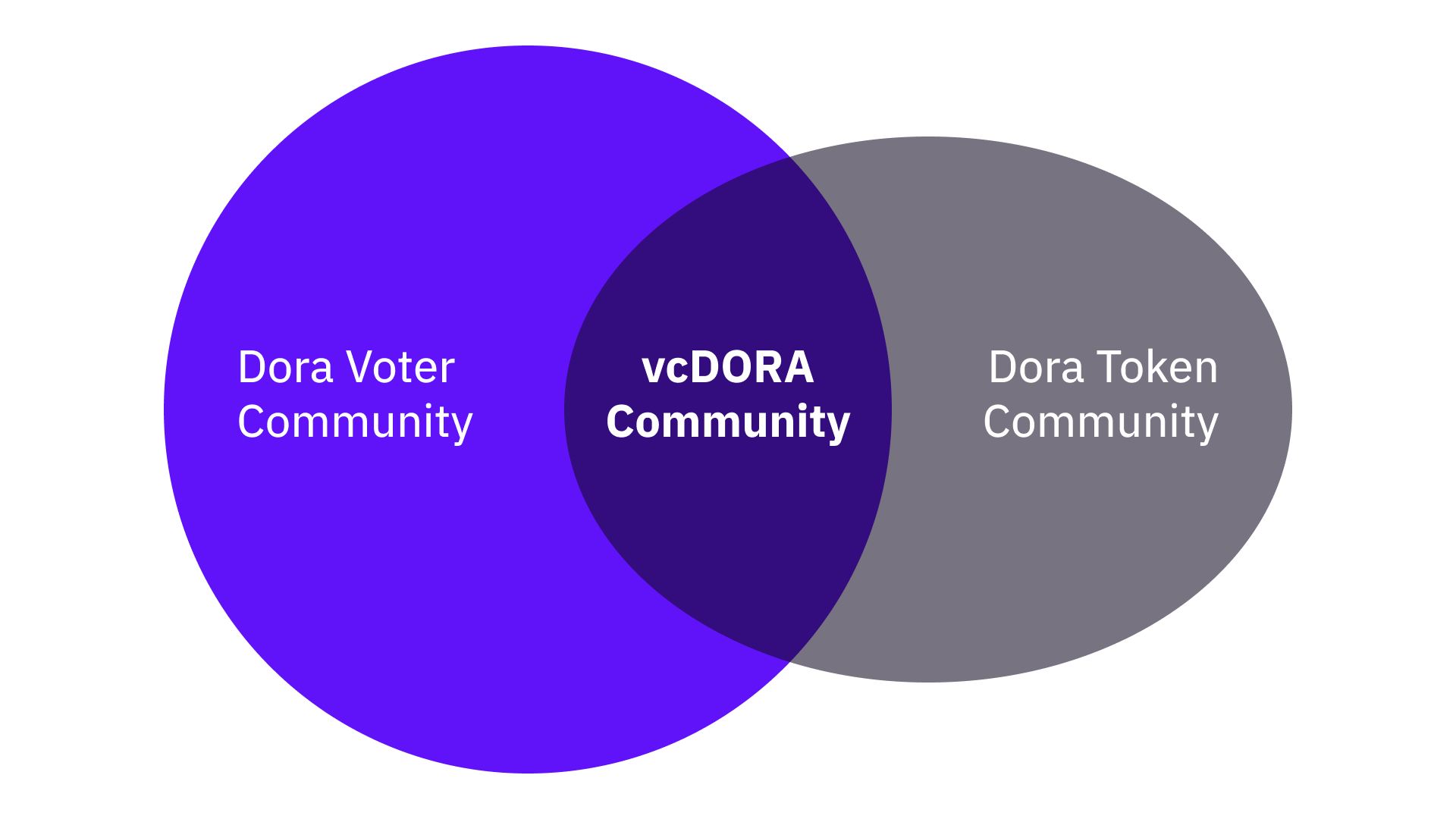
Finite governance power — there’s a maximum number of vcDORA that can be created at any point of time, given that currently DORA has a fixed total supply, and the max staking time is 4 years. The table below shows the number of vcDORA created from staking 1 DORA but different periods (note that only “one week” is precisely defined as 7 days, “month” and “year” are defined using “week”, not precise days).
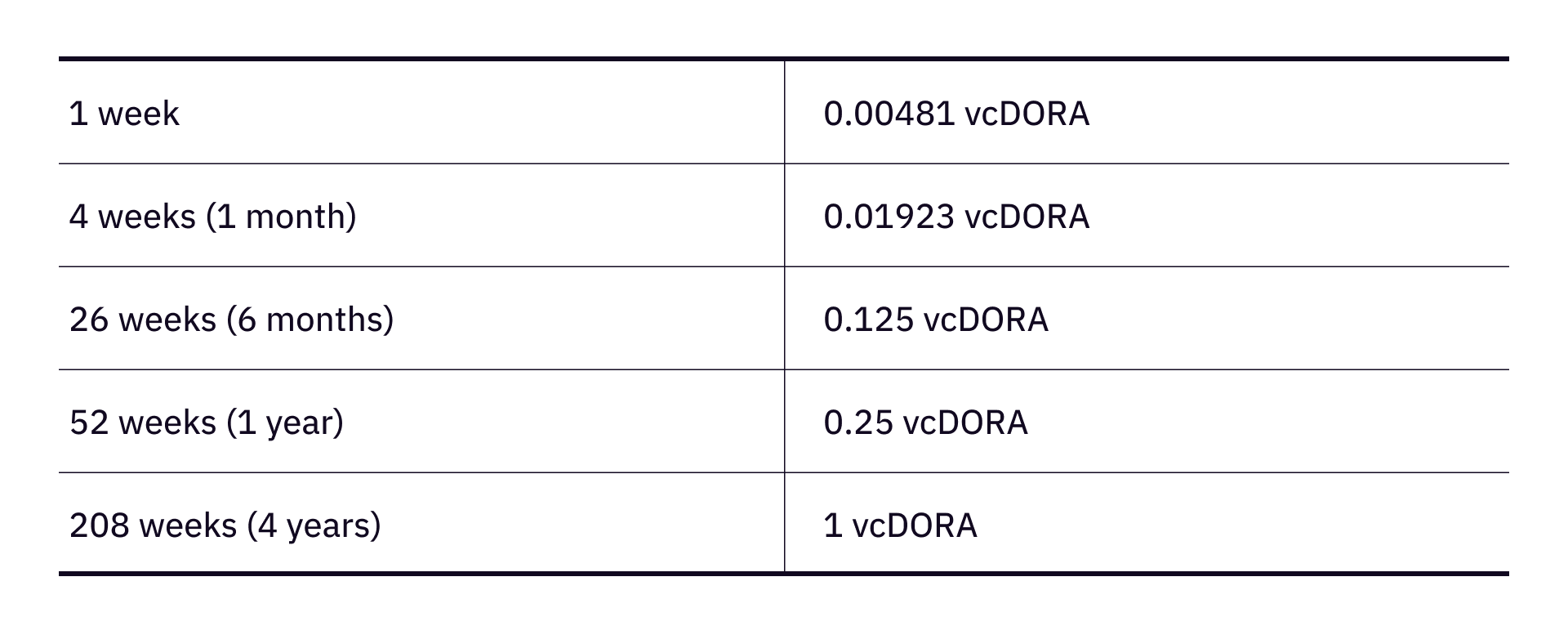
Non-transferrable — vcDORA itself is non-transferrable, so people cannot trade vcDORA, this prevents direct vote bribing.
Declining influence — immediately after staking, vcDORA will automatically decline as time flows, until the end of staking period, when the number of vcDORA becomes 0. This ensures that new participants always have an advantage compared to “old” participants. It is important to grant DAO governance when technology quickly evolves, the vcDORA governance community can always renew itself and prevent gerontocracy.
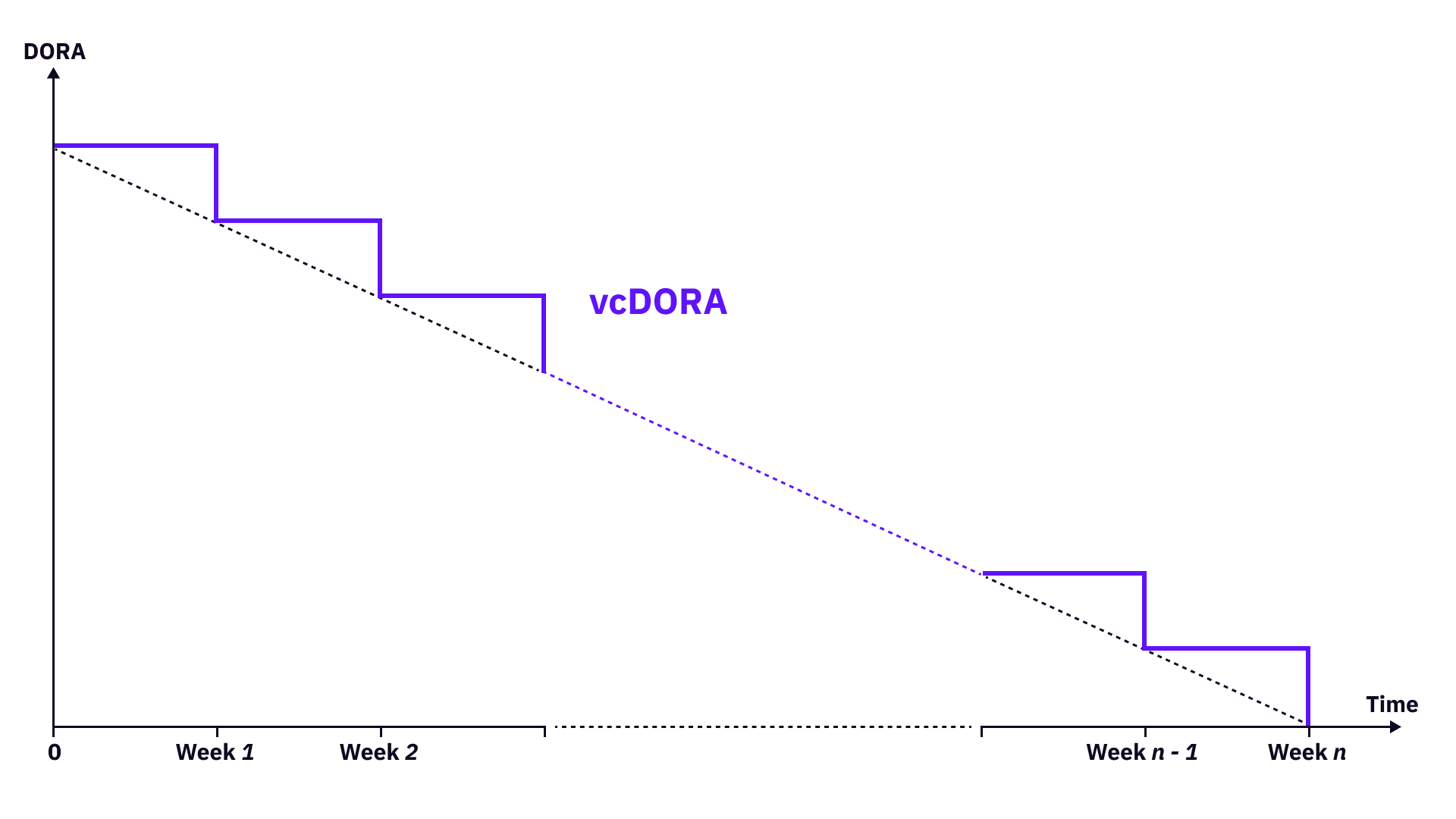
The amount of vcDORA an address has will decrease linearly over time. At the time when staking period ends, the number of vcDORA of this address will decrease to zero, and DORA will be unlocked from staking. Therefore, draw a straight line between (0, DORA_staked) and (time_staked,0), the line will represent how vcDORA will change over time. In practice, an n-week staking generated vcDORA will linearly decrease to 0.
Renewable — an address can renew its DORA staking by extending the staking time, or increasing DORA staked. The following graph explains how these two behaviors affect vcDORA.
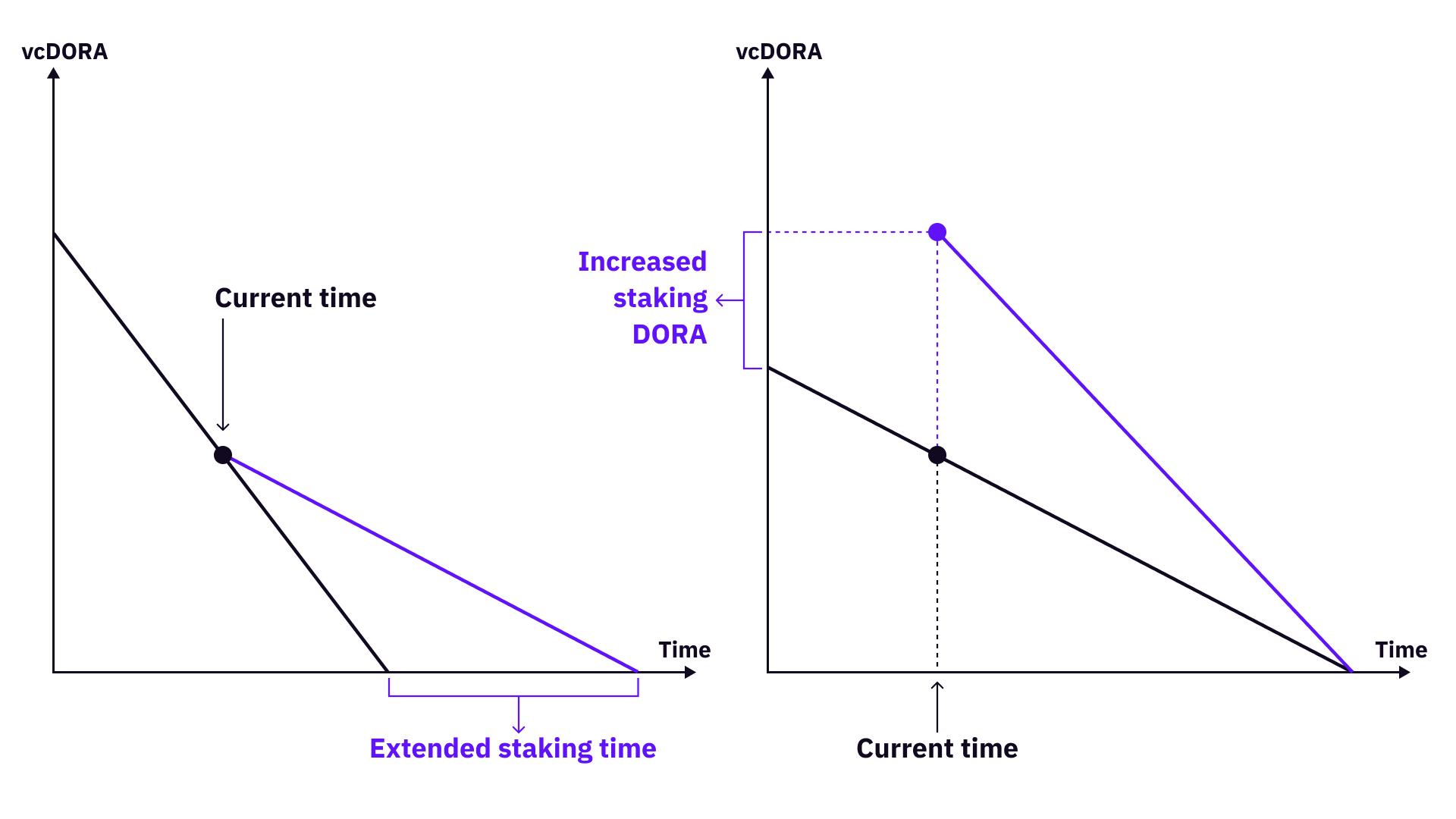
One way to evaluate total governance power represented by a certain amount of vcDORA is to calculate the area under the line. If the vcDORA governance power is not a line, then as long as the curve is integrable, take the integral of the curve from the current time to the end of time (vcDORA drops to 0).
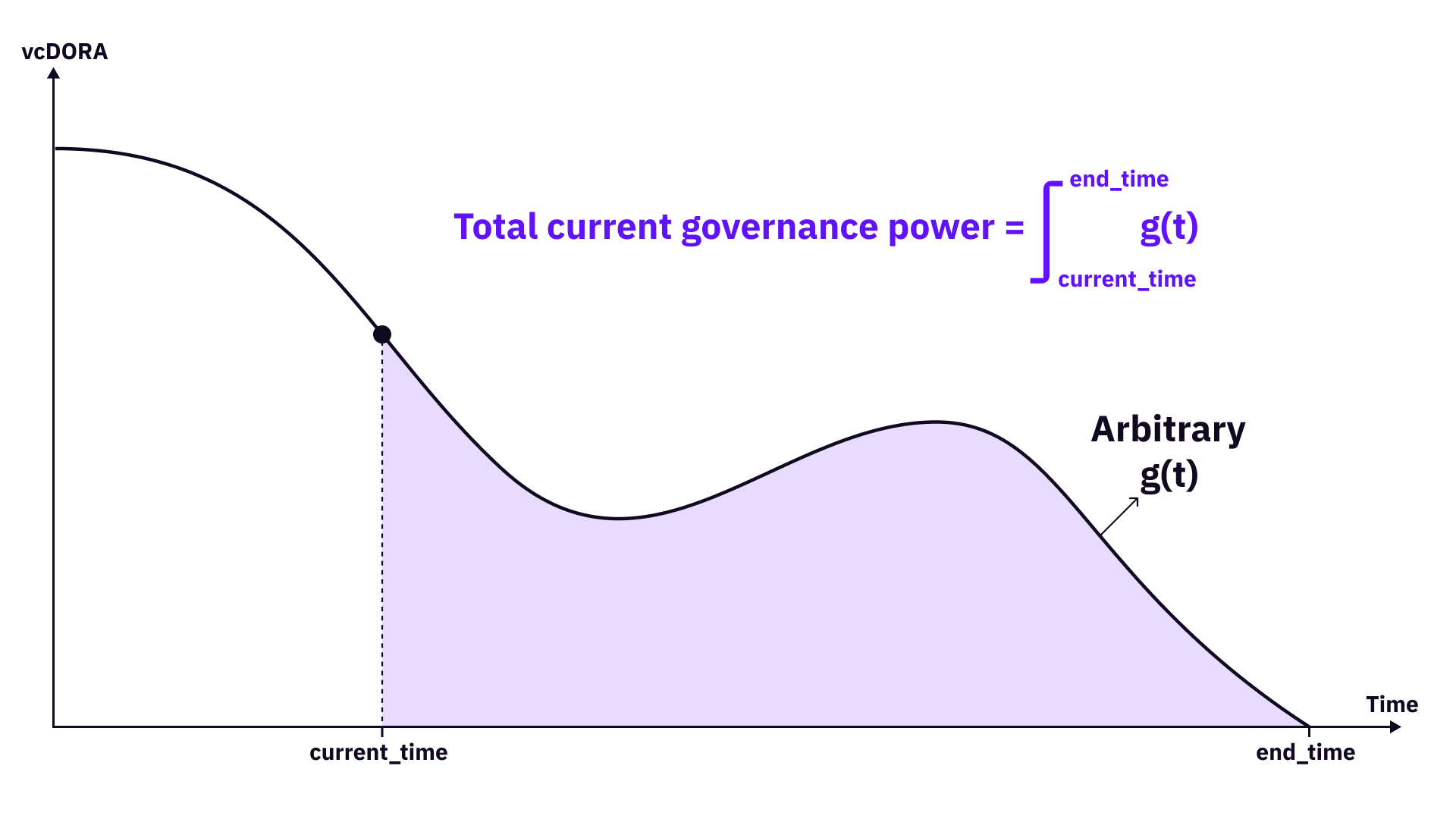
Now we can look at how grant DAOs from Dora communities can use vcDORA for governance.
As a DAO-agnostic voice credit system, vcDORA can be used in separate Grant DAOs. It is best for DAOs from the Dora community to use vcDORA, but it can also be used by any organizations that seek engagement with the Dora community. Technically, vcDORA can be used in arbitrary ways. It will perform well when the above mentioned features are matching the needs of the DAO. Here is a list of immediately obvious use cases, but as the Dora community grows and more functions are added to DoraHacks.io and Dora Factory.
Use case 1: vcDORA as whitelisting / anti-sybil threshold in quadratic governance
Voting with a staking deposit can significantly increase the cost of sybil attacks in quadratic governance DAOs. Instead of requiring a staking amount for a fixed period of time, now a Grant DAO can require voters to have a certain amount of vcDORA by some time during the voting period.
If we assume sybil attack schemes are predictable during any short period of time, then every grant round has a cost threshold for sybil attacks. The incentives of a single sybil attack must exceed the cost of the attack, so that the attack can make sense. Therefore, if vcDORA is used as an anti-sybil threshold, the cost of having vcDORA should be greater than the cost of performing sybil attacks at that time.
With vcDORA, voters have different options to obtain the same amount of vcDORA. Here is an example of different ways to get 1 vcDORA.
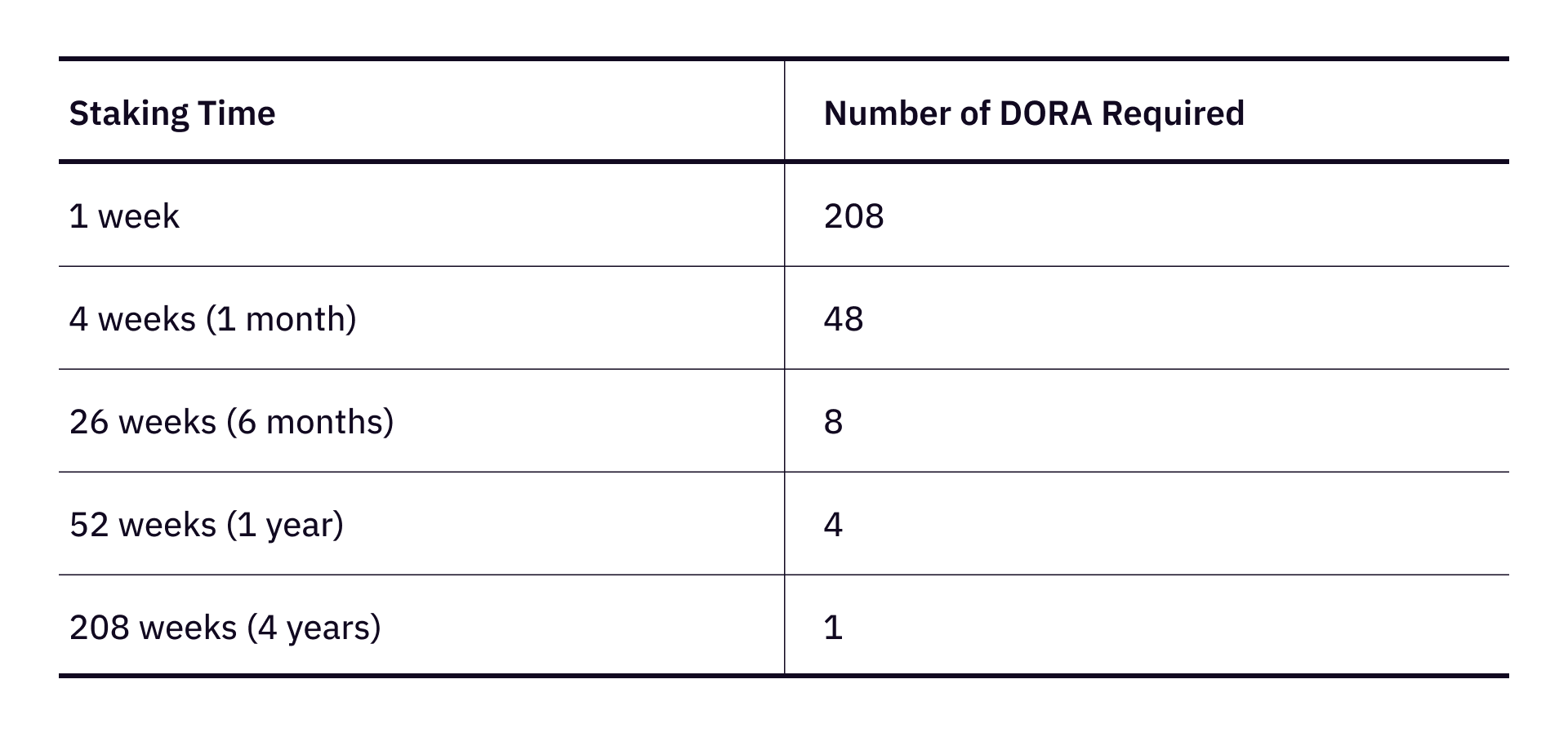
Use case 2: vcDORA as voting voice credit
vcDORA itself can be a voting voice credit, and it’s agnostic to the choice of voting mechanisms. The voice credit can be directly used to vote in a stake-time-weighted system, or can be used as an intermediary in more complex voting schemes.
Use case 3: Design voter agnostic airdrop mechanisms
vcDORA alone is NOT going to solve all governance problems for open community Grant DAOs. Instead, it needs to be used together with other infrastructures and voting mechanisms. vcDORA itself provides a permissionless voice credit that can be fed into voting schemes and governance mechanisms, and create desired outcomes.
For example, using vcDORA in a zero-knowledge voting system can effectively hide voting information while verifying voting results. Voter airdropping had always been a destructive thing because it was mostly used as a voter bribery trick. However, if voting information is hidden from the grantees, and votes are vcDORA weighted, grantees can airdrop tokens retrospectively (though airdrops should never be guaranteed) to the whole voter community, instead of cherry picking voters who vote for a specific grantee. In this way, airdrop can be a legit way to incentivize voter participation without destructing the trust of the whole system.
Conclusion
Grant DAO is a useful framework for fund distribution and ecosystem growth with community involvement. Open-community grant DAO governance is challenging. vcDORA is designed to be a general voice credit for Grant DAOs with some desired features:
- Voters can join grant DAO communities without permission.
- Voters do not need to provide personal information in order to participate.
- vcDORA is independent from voting mechanisms. As a voice credit, it is compatible with multiple voting schemes, including direct voting (with vcDORA), quadratic voting, and MACI voting.
- vcDORA can be applied to multiple use cases, such as anti-sybil whitelisting threshold and voting voice credit.
- vcDORA can be used together with other Dora infrastructures such as grant fund distribution algorithm, quadratic governance, and MACI, in order to achieve ideal outcomes in Grant DAO governance.
There are other possible useful features or improvements, which can be considered during future protocol upgrades of vcDORA. A non-exhaustive list:
- A rage-quit (early exit) mechanism for people who want to exit the community before vcDORA is exhausted, while being fair to other members of the community.
- Non-linear governance power curves and rationales.
- Secure ways to build vcDORA on non-Ethereum chains and non-EVM chains, and cross-chain validation of vcDORA.
- Fair and collusion-free airdrop protocols to create positive incentive loops within Dora Grant DAOs.